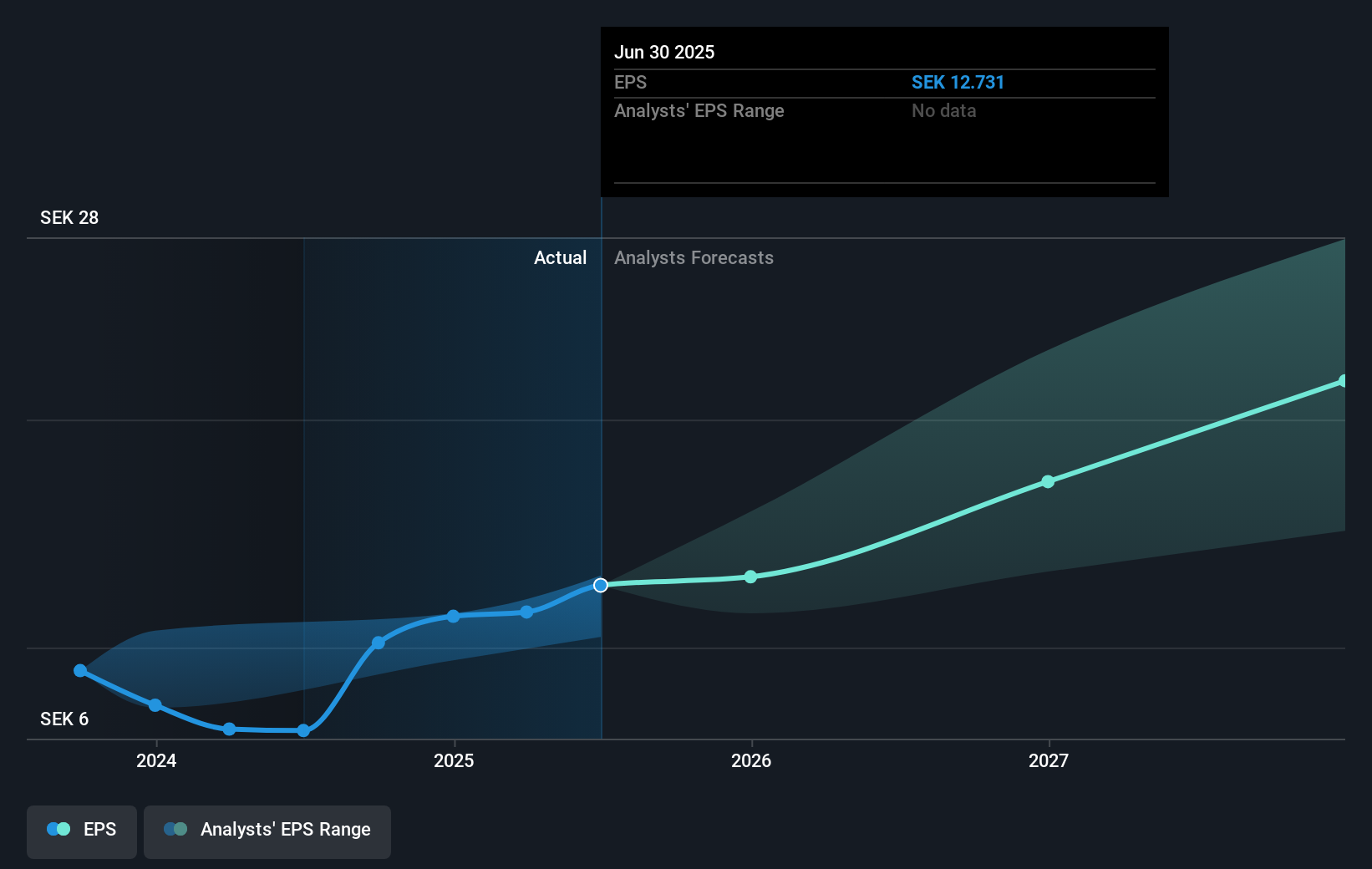The total return for Swedish Orphan Biovitrum (STO:SOBI) investors has risen faster than earnings growth over the last five years
While Swedish Orphan Biovitrum AB (publ) (STO:SOBI) shareholders are probably generally happy, the stock hasn't had particularly good run recently, with the share price falling 10% in the last quarter. On the bright side the share price is up over the last half decade. In that time, it is up 29%, which isn't bad, but is below the market return of 48%.
Although Swedish Orphan Biovitrum has shed kr3.4b from its market cap this week, let's take a look at its longer term fundamental trends and see if they've driven returns.
While the efficient markets hypothesis continues to be taught by some, it has been proven that markets are over-reactive dynamic systems, and investors are not always rational. One way to examine how market sentiment has changed over time is to look at the interaction between a company's share price and its earnings per share (EPS).
During five years of share price growth, Swedish Orphan Biovitrum achieved compound earnings per share (EPS) growth of 1.9% per year. This EPS growth is lower than the 5% average annual increase in the share price. So it's fair to assume the market has a higher opinion of the business than it did five years ago. That's not necessarily surprising considering the five-year track record of earnings growth.
The graphic below depicts how EPS has changed over time (unveil the exact values by clicking on the image).

We know that Swedish Orphan Biovitrum has improved its bottom line lately, but is it going to grow revenue? You could check out this free report showing analyst revenue forecasts.
What About The Total Shareholder Return (TSR)?
We'd be remiss not to mention the difference between Swedish Orphan Biovitrum's total shareholder return (TSR) and its share price return. Arguably the TSR is a more complete return calculation because it accounts for the value of dividends (as if they were reinvested), along with the hypothetical value of any discounted capital that have been offered to shareholders. Swedish Orphan Biovitrum hasn't been paying dividends, but its TSR of 35% exceeds its share price return of 29%, implying it has either spun-off a business, or raised capital at a discount; thereby providing additional value to shareholders.
A Different Perspective
Swedish Orphan Biovitrum shareholders are down 10% for the year, but the market itself is up 4.0%. However, keep in mind that even the best stocks will sometimes underperform the market over a twelve month period. On the bright side, long term shareholders have made money, with a gain of 6% per year over half a decade. If the fundamental data continues to indicate long term sustainable growth, the current sell-off could be an opportunity worth considering. While it is well worth considering the different impacts that market conditions can have on the share price, there are other factors that are even more important. Take risks, for example - Swedish Orphan Biovitrum has 1 warning sign we think you should be aware of.
Of course Swedish Orphan Biovitrum may not be the best stock to buy. So you may wish to see this free collection of growth stocks.
Please note, the market returns quoted in this article reflect the market weighted average returns of stocks that currently trade on Swedish exchanges.
New: Manage All Your Stock Portfolios in One Place
We've created the ultimate portfolio companion for stock investors, and it's free.
• Connect an unlimited number of Portfolios and see your total in one currency
• Be alerted to new Warning Signs or Risks via email or mobile
• Track the Fair Value of your stocks
Have feedback on this article? Concerned about the content? Get in touch with us directly. Alternatively, email editorial-team (at) simplywallst.com.
This article by Simply Wall St is general in nature. We provide commentary based on historical data and analyst forecasts only using an unbiased methodology and our articles are not intended to be financial advice. It does not constitute a recommendation to buy or sell any stock, and does not take account of your objectives, or your financial situation. We aim to bring you long-term focused analysis driven by fundamental data. Note that our analysis may not factor in the latest price-sensitive company announcements or qualitative material. Simply Wall St has no position in any stocks mentioned.
About OM:SOBI
Swedish Orphan Biovitrum
A biopharma company, provides medicines in the areas of haematology, immunology, and specialty care in Europe, North America, the Middle East, Asia, and Australia.
Undervalued with solid track record.
Similar Companies
Market Insights
Community Narratives





